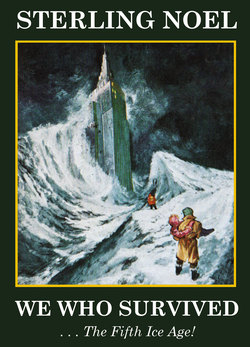Читать книгу We Who Survived - Sterling Noel - Страница 14
На сайте Литреса книга снята с продажи.
10
ОглавлениеRANCE GOODRICH, ten years younger than I, was one of the most brilliant industrial designers of the Dynamics Radical and had achieved world-wide acclaim at 25 for his conception of automatic electronic control of the Plymouth Platforms. All of the current Platform installations were of his own creation, as well as the magnetic field modifiers that kept them in orbit.
“The main feature of this machine,” he said, “is the wheels, which are essentially oversized inflated rubber tires, much the same kind used for this purpose in the Arctic before the age of flight. It is obvious to all of us that any air-borne vehicle is more efficient for any transportation purpose than a surface vehicle, but I am assured by Dr. Harrow and others that flight will be impossible for many years because of the high winds.
“These wheels of ours, which we constructed at Dynamic, are my particular pride, for they are individually self-powered with Utley Progravity Gyros, deriving their basic energy from small fusion reactors within the hubs. They will turn under any possible conditions of terrain we may encounter. The rest of the vehicle is more or less standard, with a permanium and lomax alloy cabin large enough for twenty or so, and lomax alloy frame and fittings.
“It is my understanding that we will not assemble our vehicle until we are ready to use it, so you will not be able to examine this obsolete marvel at present. But I hope that, when you do finally see it, you will restrain your laughter. It may save our lives.”
Rance’s dessertation ended the discussion, and a vote was taken immediately on whether or not we would seek to use his machine. Again the ayes were unanimous, with the exception of Steve Engles. Gabe then called for adjournment until Saturday evening.
I returned to the living room just behind Steve. He asked Florence Donner, a striking green-eyed redhead who had been Elaine Harrow’s roommate at Oriental, if she had seen his mother.
“Cora’s up above,” said Florence. “She said she had a headache.”
He addressed Dr. Rufe Howard, who had been playing parch with Florence. “Do you mind coming up and having a look at her?” he said.
“Cora’s healthier than you are,” said Rufe. “All’s the matter with her is too much imagination.”
Steve clenched his fists and stood with his legs apart, glaring at Dr. Howard. “You don’t know a damn thing about my mother,” he said angrily.
Rufe looked up at him startled, then smiled. “I’ve known Cora longer than you have,” he said quietly. “She’s always had headaches—and heart palpitations—when situations were not to her liking. However, I’ll go up and see her if you insist.”
“Never mind!” said Steve, turning abruptly and heading for the stairway in the hall.
“Whew!” exclaimed Florence. “What a temper he’s got!”
“He won’t be with us, so we don’t have to worry about that,” I said.
“I don’t think we will miss them,” said Rufe Howard. “There’s a classic example of the Oedipus complex, modified—or probably multiplied—by the Gerber Therapy.”
“What do you suppose is going on?” asked Florence, pointing her thumb upward.
“Steve is comforting his mother,” said Rufe. “He is telling her how much he loves her and how he will protect her from the bad world.”
“I wish I could get a big man like him to tell me that,” said Florence.
“You can,” said Rufe. “Just raise a big son and give him the Gerber Series.”
